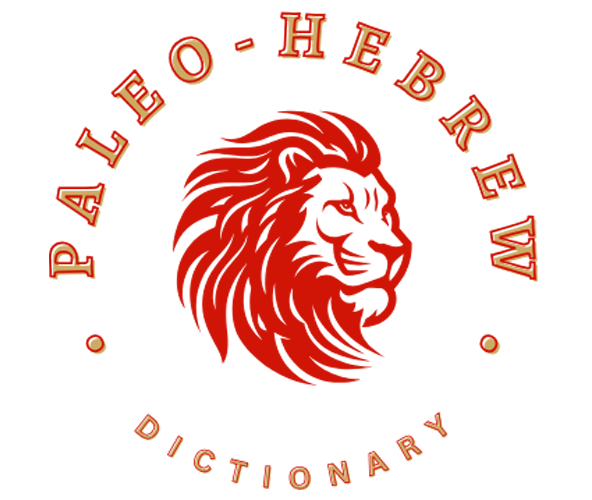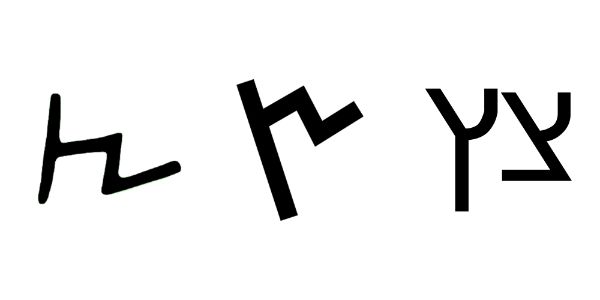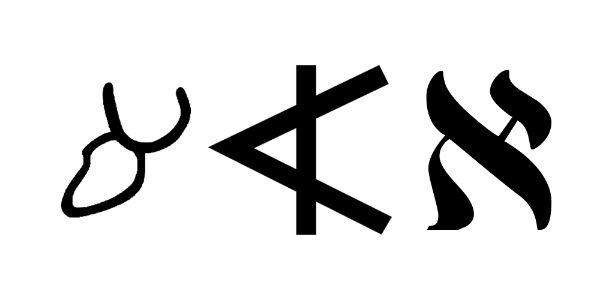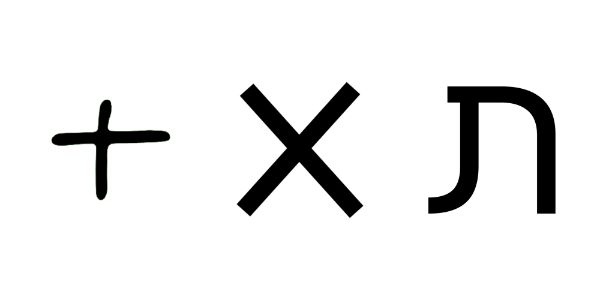The word khanauak (𐤇𐤍𐤅𐤊) or “Enoch” is associated with two individuals. One is a descendant of 𐤔𐤕 (Shat). The second is a descendant of 𐤒𐤉𐤍 (Qayan).
The Paleo-Hebrew language or the original language of the Ābarayam is one spoken with an emphasis on the rauakh (breath, wind, spirit). With the language of the Ābarayam, each letter has a meaning and a number associated with it that adds meaning to each word they’re used with. Below you will be able to learn more about the letter in Ancient Hebrew, Yiddish Hebrew, Greek, and much more.
Letter Meanings
| Letter | Meaning |
|---|---|
| 𐤇 (kh) – kha | Tent wall, fence, separation, divide |
| 𐤍 (n) – na | offspring, seed, fish, heir, kingdom, continue, perpetuate |
| 𐤅 (u) – ua [ýa] | Nail, tent peg, hook, to secure, connect, Messiah |
| 𐤊 (k) – ka | palm of the hand, to open, tame, subdue, bend, curve |
| Ābarayat Number | |
| Hebrew Gematria | |
| English Gematria | |
| Simple Gematria |
Based on the meaning of the letters the word could be defined as:
- “fence (protection) of kingdom of Messiah to subdue”
- “separation of heir of Messiah to open”
Definitions for 𐤇𐤍𐤅𐤊 / khanauak
| Language | Word | Transliteration | Pronunciation | Definition |
|---|---|---|---|---|
| Ābarayat | 𐤇𐤍𐤅𐤊 | khanauak | khan-ook | Inaugurated, Trained, Initiated, Dedicated, Teacher |
| English | Enoch | Enoch | ee-nuhk | the father of Methuselah. Genesis 5:22. a son of Cain. Genesis 4:17. |
| Hebrew | חֲנוֹךְ | Chanok | khan-oke’ | four Israelites, sons of Cain, Jered, Midian, and Reuben. |
| Arabic | تنوير اينوك | tanwir aynuk | tan-wir awy-nook | enlightenment, illumination, edification, schooling, enlighten |
| Greek | Ἐνώχ | Enóch | en-oke’ | Enoch, a patriarch, son of Jared, and father of Methuselah. |
Son of 𐤒𐤉𐤍 (Qayan)
The one born to 𐤒𐤉𐤍 (Qayan) is the lesser discussed of the two individuals. He was born in the Land of 𐤍𐤅𐤃 (Nauad) by the sister-wife of 𐤒𐤉𐤍 (Qayan). After his birth, the 𐤏𐤁𐤓𐤉 (Ābaray) text of 𐤁𐤓𐤀𐤔𐤉𐤕 (BaRaashayat) 4:17 is unclear. Either he built a city in his own name or his father 𐤒𐤉𐤍 (Qayan) built a city and named it after him. According to 𐤉𐤅𐤁𐤋 (Yauabal) 4:9, his mother/aunt was named 𐤏𐤅𐤍 (Āuan). According to a Samaritan tradition, he was buried in Mount 𐤏𐤉𐤁𐤋 (Āyabal).
Son of 𐤉𐤓𐤃 (Yarad)
The one born to 𐤉𐤓𐤃 (Yarad), 𐤁𐤍 (ban) of 𐤌𐤄𐤋𐤋𐤀𐤋 (Mahalalal), 𐤁𐤍 (ban) of 𐤒𐤉𐤍𐤍 (Qayanan), 𐤁𐤍 (ban) of 𐤀𐤍𐤅𐤔 (Anauash), 𐤁𐤍 (ban) of 𐤔𐤕 (Shat) is the more well-known individual. He is an ancestor to 𐤍𐤅𐤇 (Nauakh) and lived before the Great Flood. Also, he is the enlightened author of the Book of Enoch.
The text of the Book of 𐤁𐤓𐤀𐤔𐤉𐤕 (BaRaashayat) says he lived 365 years before he was taken by 𐤉𐤄𐤅𐤄 (Yahauah) / 𐤉𐤄𐤉𐤄 (Yahayah). The text reads that he “walked with 𐤀𐤋𐤄𐤉𐤌 (alahayam): and he was no more; for 𐤀𐤋𐤄𐤉𐤌 (alahayam) took him” 𐤁𐤓𐤀𐤔𐤉𐤕 (BaRaashayat) 5:21–24. Some interpret this as him entering the 𐤔𐤌𐤉𐤌 (shamayam).
Genealogy
| Generation | Direct Lineage | Sibling Lineage |
|---|---|---|
| 1st Generation | 𐤀𐤃𐤌 (Adam) | |
| 2nd Generation | 𐤔𐤕 (Shat) | 𐤒𐤉𐤍 (Qayan) 𐤄𐤁𐤋 (Habal) |
| 3rd Generation | 𐤀𐤍𐤅𐤔 (Anauash) | |
| 4th Generation | 𐤒𐤉𐤍𐤍 (Qayanan) | |
| 5th Generation | 𐤌𐤄𐤋𐤋𐤀𐤋 (Mahalalaal) | |
| 6th Generation | 𐤉𐤓𐤃 (Yarad) | |
| 7th Generation | 𐤇𐤍𐤅𐤊 (Khanauak) | |
| 8th Generation | 𐤌𐤕𐤅𐤔𐤋𐤇 (Matauashalakh) |
Images for 𐤇𐤍𐤅𐤊 / khanauak
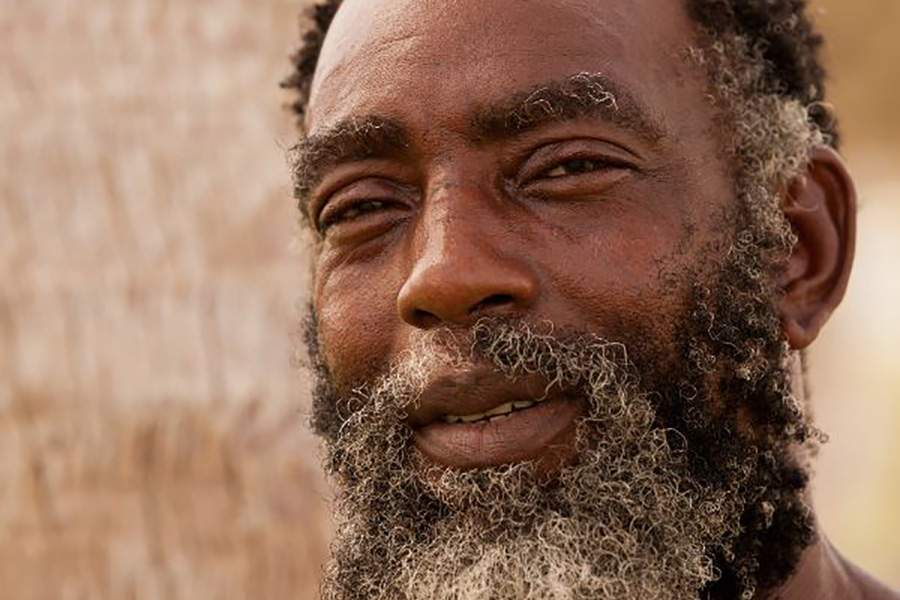

Maps for 𐤇𐤍𐤅𐤊 / khanauak

Definitions for 𐤇𐤍𐤅𐤊𐤉 / khanauakay
When adding the 𐤉 (yad) to the end of a word, it creates a possessive of the original word. It can either signify “my…” or identify a member of a nation. For example, 𐤏𐤁𐤓 (Ābar) is the progenitor, but 𐤏𐤁𐤓𐤉 (Ābaray) is the singular descendant of him also known as a Hebrew.
| Language | Word | Transliteration | Pronunciation | Definition |
|---|---|---|---|---|
| Ābarayat | 𐤇𐤍𐤅𐤊𐤉 | khanauakay | khan-ookey | descendant of Khanauak |
| English | Enochi Enochite | Enochi Enochite | ee-nuhk-i ee-nuhk-ahyt | descendants of Enoch. |
| Hebrew | חֲנֹכִי | Chanoki | khan-o-kee’ | descendants of Enoch. |
| Arabic | تعليم | taelim | tah-leem | education, teaching, instruction, schooling, marking, precept, schoolteaching, document, direction. |
| Greek | Χάντσι | Khantsi | khan-see | descendants of Enoch. Israelites. |
The Enochites
𐤇𐤍𐤅𐤊𐤉 (Khanauakay) meaning Enochite is associated with descendants of two individuals. One is a descendant of 𐤔𐤕 (Shat). The second is a descendant of 𐤒𐤉𐤍 (Qayan). Those born of the line of 𐤒𐤉𐤍 (Qayan) were presumably wiped out during The Great Flood. The descendants of 𐤇𐤍𐤊 (Khanauak) who were born of the line of 𐤔𐤕 (Shat) existed prior to the Great Flood. It may also be a reference to those who study under 𐤇𐤍𐤊 (Khanauak) since his name is in reference to education, teaching, and instruction. This could be in reference to those who became learned by the teachings of 𐤇𐤍𐤊 (Khanauak).
Images for 𐤇𐤍𐤅𐤊𐤉 / khanauakay


Definitions for 𐤇𐤍𐤅𐤊𐤉𐤌 / khauayalahayam
When adding the 𐤌 (mayam) after the 𐤉 (yad) to the end of a word, it creates a plural of the original word. It can identify multiple members of a nation. For example, 𐤏𐤁𐤓 (Ābar) is the progenitor, but 𐤏𐤁𐤓𐤉𐤌 (Ābarayam) are the plural descendants of him also known as Hebrews.
| Language | Word | Transliteration | Pronunciation | Definition |
|---|---|---|---|---|
| Ābarayat | 𐤇𐤍𐤅𐤊𐤉𐤌 | khauayalahayam | khan-ook-yawm | descendants of Khanauak |
| English | Educators | Educators | ej-oo-key-ters | people or things that educate, especially teachers, principals, or other persons involved in planning or directing education. |
| Hebrew | ||||
| Arabic | ||||
| Greek |
Images for 𐤇𐤍𐤅𐤊𐤉𐤌 / khauayalahayam


Definitions for 𐤇𐤍𐤅𐤊𐤉𐤕 / khauayalahayat
When adding the 𐤕 (tau) after the 𐤉 (yad) to the end of a word, it creates a plural of the original word. It identifies the language or a sign of a nation’s existence. For example, 𐤏𐤁𐤓 (Ābar) is the progenitor, but 𐤏𐤁𐤓𐤉𐤕 (Ābarayat) is the language of him also known as Paleo-Hebrew language.
| Language | Word | Transliteration | Pronunciation | Definition |
|---|---|---|---|---|
| Ābarayat | 𐤇𐤍𐤅𐤊𐤉𐤕 | khauayalahayat | khan-ook-yawt | Enochian |
| English | Enochian | Enochian | ee-nuhk-ee-uhn | an occult constructed language — said by its originators to have been received from angels |
| Hebrew | ||||
| Arabic | ||||
| Greek |
Enochian
Enochian is an occult constructed language — said by its originators to have been received from angels — recorded in the private journals of John Dee and his colleague Edward Kelley in late 16th-century England. Kelley was a scryer who worked with Dee in his magical investigations. The language is integral to the practice of Enochian magic.
This language was called Angelical by Dee and later came to be referred to as ‘Enochian’ by subsequent writers. The phonology and grammar resemble English, though the translations are not sufficient to work out any regular morphology. Some Enochian words resemble words and proper names in the scriptures, but most have no apparent etymology.
Dee’s journals also refer to this language as “Celestial Speech”, “First Language of God-Christ”, “Holy Language”, or “Language of Angels”. He also referred to it as “Adamical” because, according to Dee’s angels, it was used by Adam in Paradise to name all things. The term “Enochian” comes from Dee’s assertion that the Biblical patriarch 𐤇𐤍𐤅𐤊 (Khanauak) had been the last human (before Dee and Kelley) to know the language.
Images for 𐤇𐤍𐤅𐤊𐤉𐤕 / khauayalahayat
| Character | Name | Transliteration | Pronunciation |
|---|---|---|---|
 | Un | A | [ɑː] |
| | Pa | B | [beɪ] |
| | Veh | C | ? |
| | Gal | D | [deɪ] |
| | Graph | E | [eɪ] |
| | Or | F | [ɛf] |
| | Ged | G | ? |
| | Na | H | [heɪ] |
| | Gon | I | [iː] |
| | Gon | Y | [iː] |
| | Ur | L | ? |
| | Tal | M | [ɛm] |
| | Drux | N | [ɛn], [nuː] |
| | Med | O | [oʊ] |
| | Mals | P | [peɪ] |
| | Ger | Q | ? |
| | Don | R | [ɑː(r)], [rɑː] |
| | Fam | S | [ɛs] |
| | Gisg | T | [teɪ] |
| | Van | U V | ? |
| | Pal | X | [ɛks] |
| Ceph | Z | [zɒd] |
Classification
You can continue your studies of the words by viewing Strong’s entries for:
